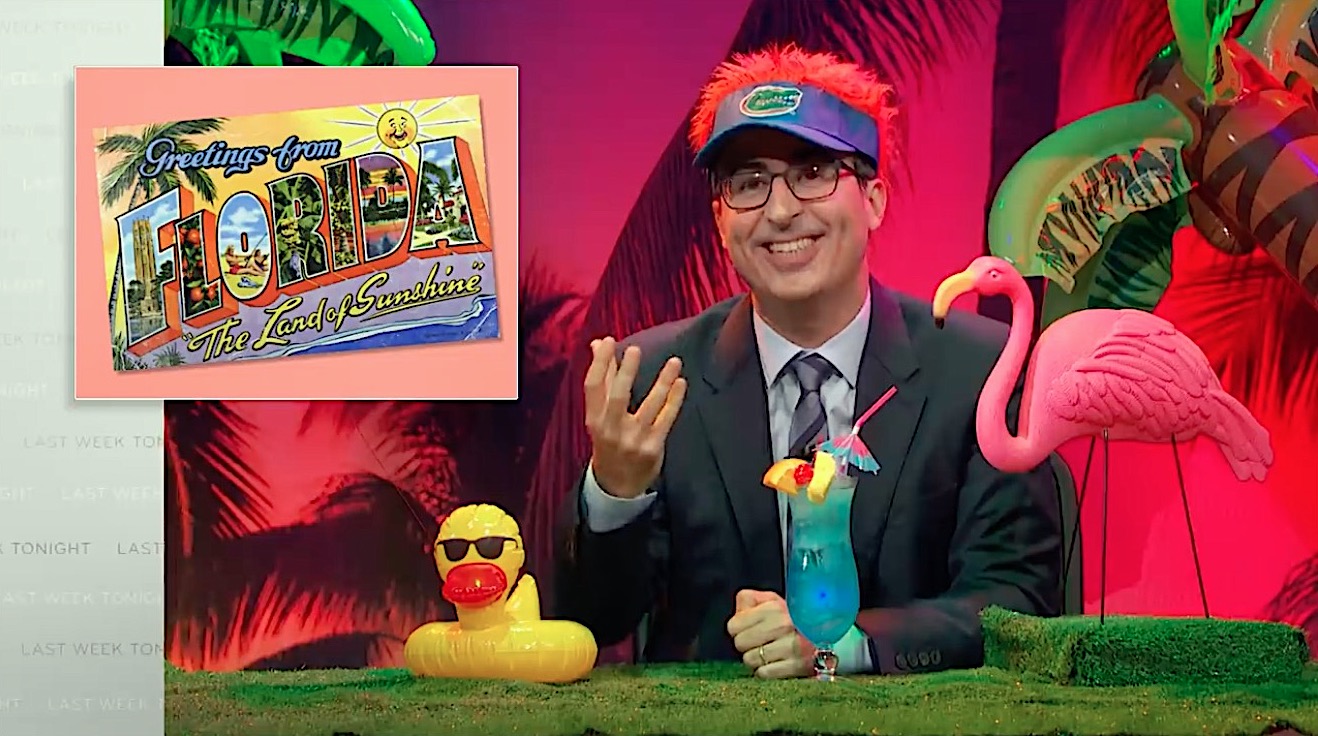John Oliver urges Florida voters to restore felons' voting rights, appealing to the state's dumb-news infamy


A free daily email with the biggest news stories of the day – and the best features from TheWeek.com
You are now subscribed
Your newsletter sign-up was successful
America is starting the final sprint to the 2018 midterm elections, but "six million people are unable to vote because at some point in their life, they committed a felony," John Oliver said on Sunday's Last Week Tonight. "If any of you are thinking at this point, 'Well, who gives a s--t if convicted felons can't vote?' you frankly wouldn't be alone." But despite what you might think, and what Senate Majority Leader Mitch McConnell (R-Ky.) says, the vast majority of felons were convicted of nonviolent offenses like property or drug crimes, Oliver said, "and for those who haver served their sentence but are still unable to vote, this situation is understandably frustrating."
"In most states, people with felony convictions automatically regain their voting rights at some point, but there are a few where they do not," Oliver said, "and the worst state of all concerning this — and, arguably, everything else — is Florida." More than 1.5 million Floridians, including more than 20 percent of black residents, can't vote due to past convictions, Oliver said, and Gov. Rick Scott (R) has enacted an "insane," openly arbitrary process for restoring voting rights.
For example, one member of Scott's rights-restoration panel repeatedly asks felons the same very odd question, Oliver noted. "Do you go to church? Now, if the answer to that question is important, that is f---ed up, and if it's not, why are you constantly asking it? Either you're factoring religious habit into evaluation of whether someone should be able to vote, or you're making a list of people's houses that would be easy to rob on a Sunday morning." Floridians can approve a constitutional amendment in November that automatically restores voting rights to most nonviolent felons, Oliver said, and he made a direct appeal to Florida voters that doubled down on Florida's history of making headlines for all the wrong reasons. The video is often NSFW. Watch below. Peter Weber
The Week
Escape your echo chamber. Get the facts behind the news, plus analysis from multiple perspectives.

Sign up for The Week's Free Newsletters
From our morning news briefing to a weekly Good News Newsletter, get the best of The Week delivered directly to your inbox.
From our morning news briefing to a weekly Good News Newsletter, get the best of The Week delivered directly to your inbox.

A free daily email with the biggest news stories of the day – and the best features from TheWeek.com
Peter has worked as a news and culture writer and editor at The Week since the site's launch in 2008. He covers politics, world affairs, religion and cultural currents. His journalism career began as a copy editor at a financial newswire and has included editorial positions at The New York Times Magazine, Facts on File, and Oregon State University.
-
 6 of the world’s most accessible destinations
6 of the world’s most accessible destinationsThe Week Recommends Experience all of Berlin, Singapore and Sydney
-
 How the FCC’s ‘equal time’ rule works
How the FCC’s ‘equal time’ rule worksIn the Spotlight The law is at the heart of the Colbert-CBS conflict
-
 What is the endgame in the DHS shutdown?
What is the endgame in the DHS shutdown?Today’s Big Question Democrats want to rein in ICE’s immigration crackdown
-
 ‘One Battle After Another’ wins Critics Choice honors
‘One Battle After Another’ wins Critics Choice honorsSpeed Read Paul Thomas Anderson’s latest film, which stars Leonardo DiCaprio, won best picture at the 31st Critics Choice Awards
-
 A peek inside Europe’s luxury new sleeper bus
A peek inside Europe’s luxury new sleeper busThe Week Recommends Overnight service with stops across Switzerland and the Netherlands promises a comfortable no-fly adventure
-
 Son arrested over killing of Rob and Michele Reiner
Son arrested over killing of Rob and Michele ReinerSpeed Read Nick, the 32-year-old son of Hollywood director Rob Reiner, has been booked for the murder of his parents
-
 Rob Reiner, wife dead in ‘apparent homicide’
Rob Reiner, wife dead in ‘apparent homicide’speed read The Reiners, found in their Los Angeles home, ‘had injuries consistent with being stabbed’
-
 Hungary’s Krasznahorkai wins Nobel for literature
Hungary’s Krasznahorkai wins Nobel for literatureSpeed Read László Krasznahorkai is the author of acclaimed novels like ‘The Melancholy of Resistance’ and ‘Satantango’
-
 Primatologist Jane Goodall dies at 91
Primatologist Jane Goodall dies at 91Speed Read She rose to fame following her groundbreaking field research with chimpanzees
-
 Florida erases rainbow crosswalk at Pulse nightclub
Florida erases rainbow crosswalk at Pulse nightclubSpeed Read The colorful crosswalk was outside the former LGBTQ nightclub where 49 people were killed in a 2016 shooting
-
 Trump says Smithsonian too focused on slavery's ills
Trump says Smithsonian too focused on slavery's illsSpeed Read The president would prefer the museum to highlight 'success,' 'brightness' and 'the future'
